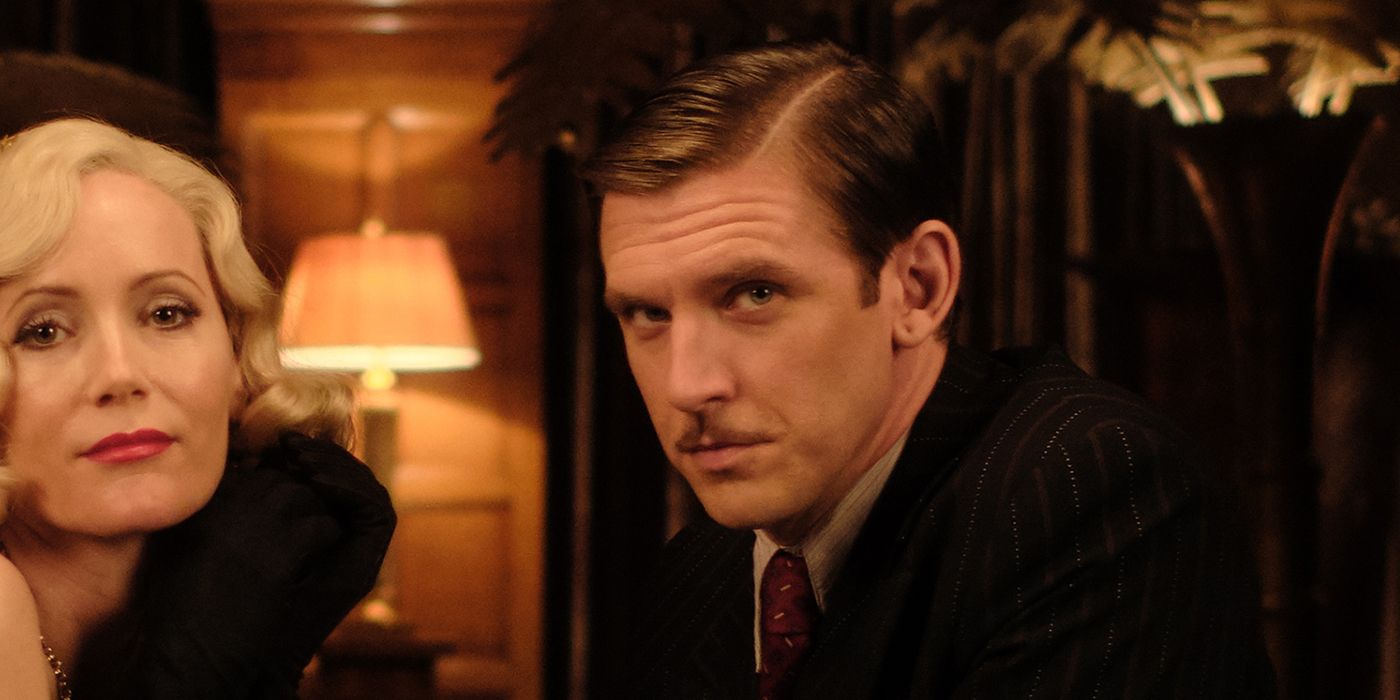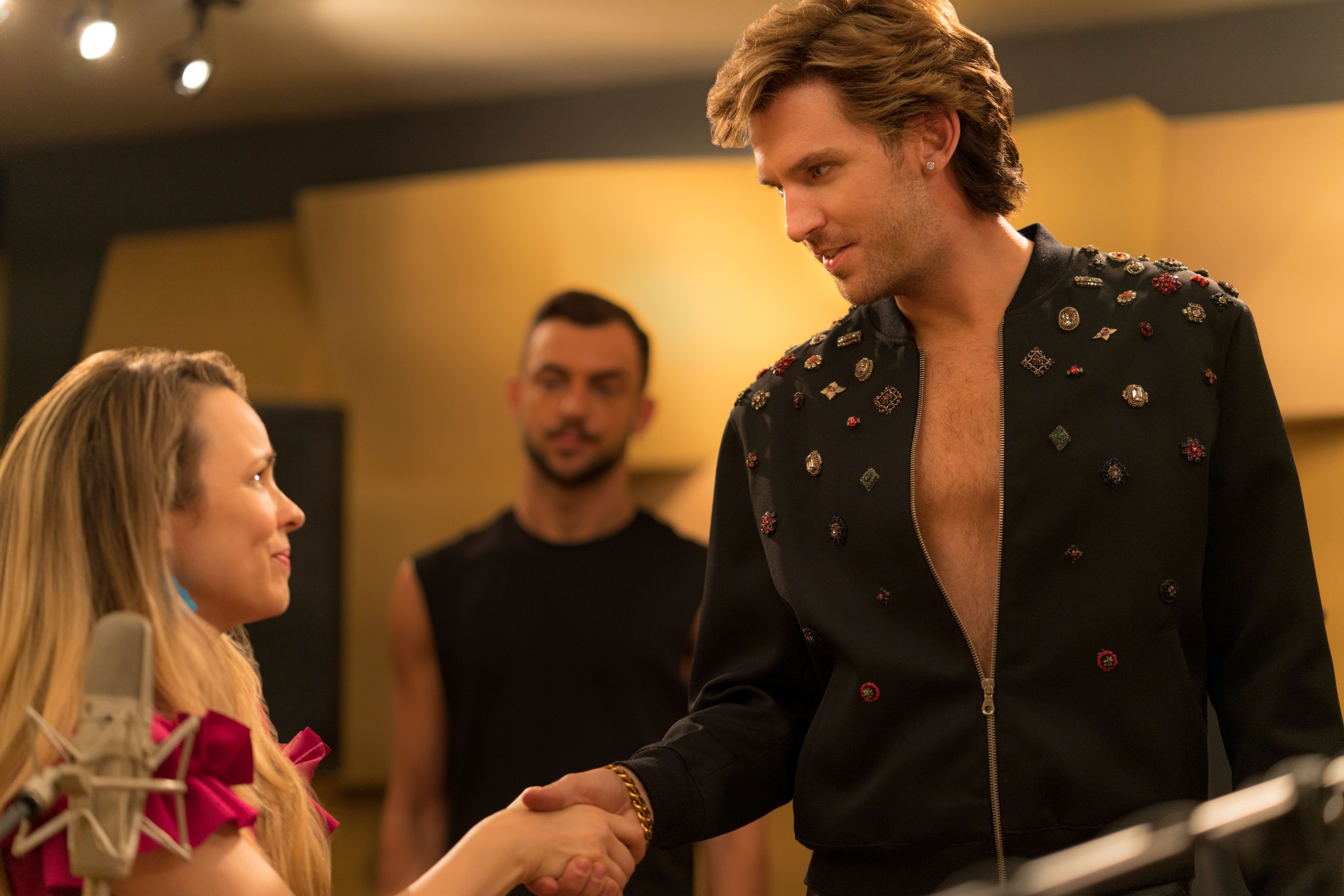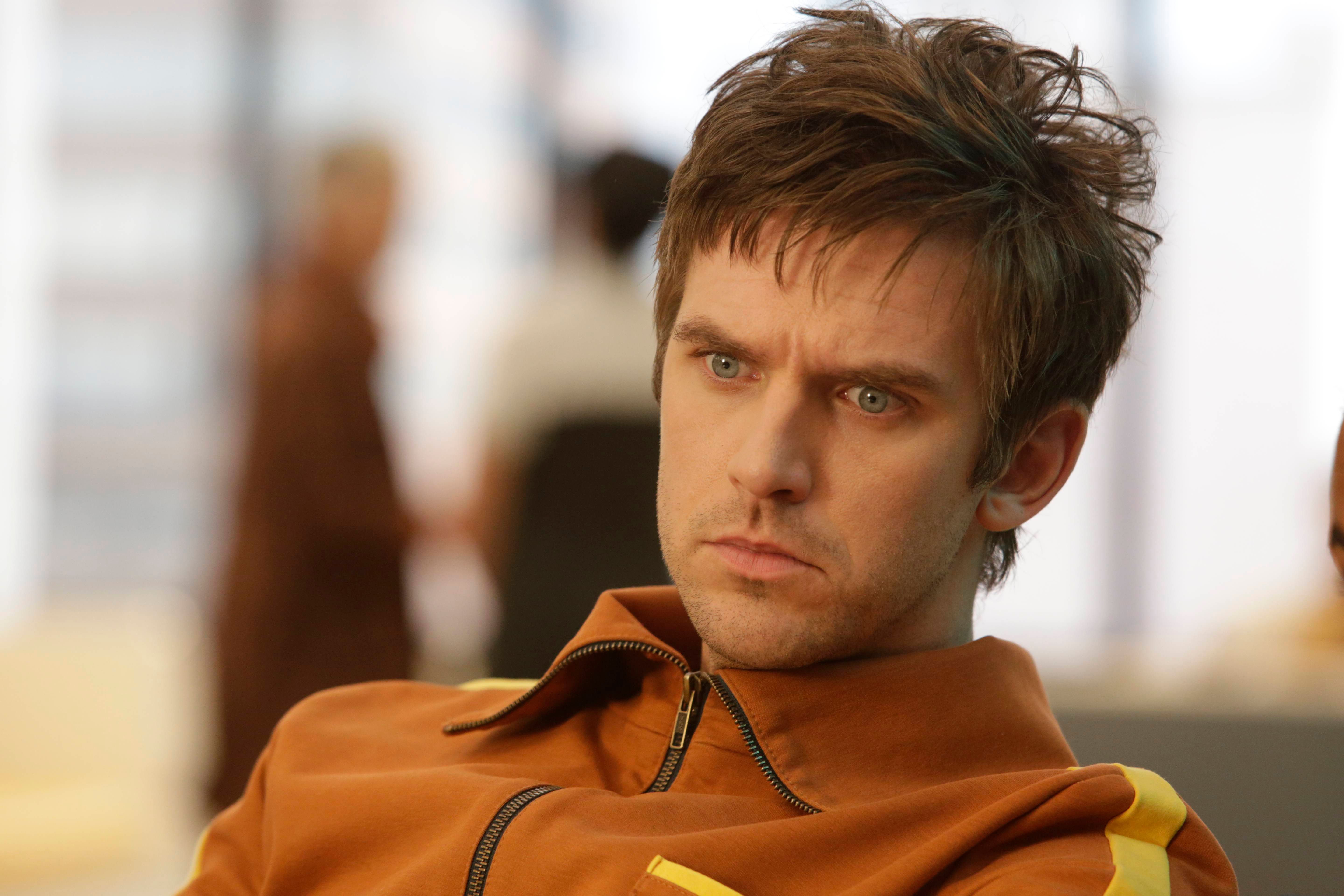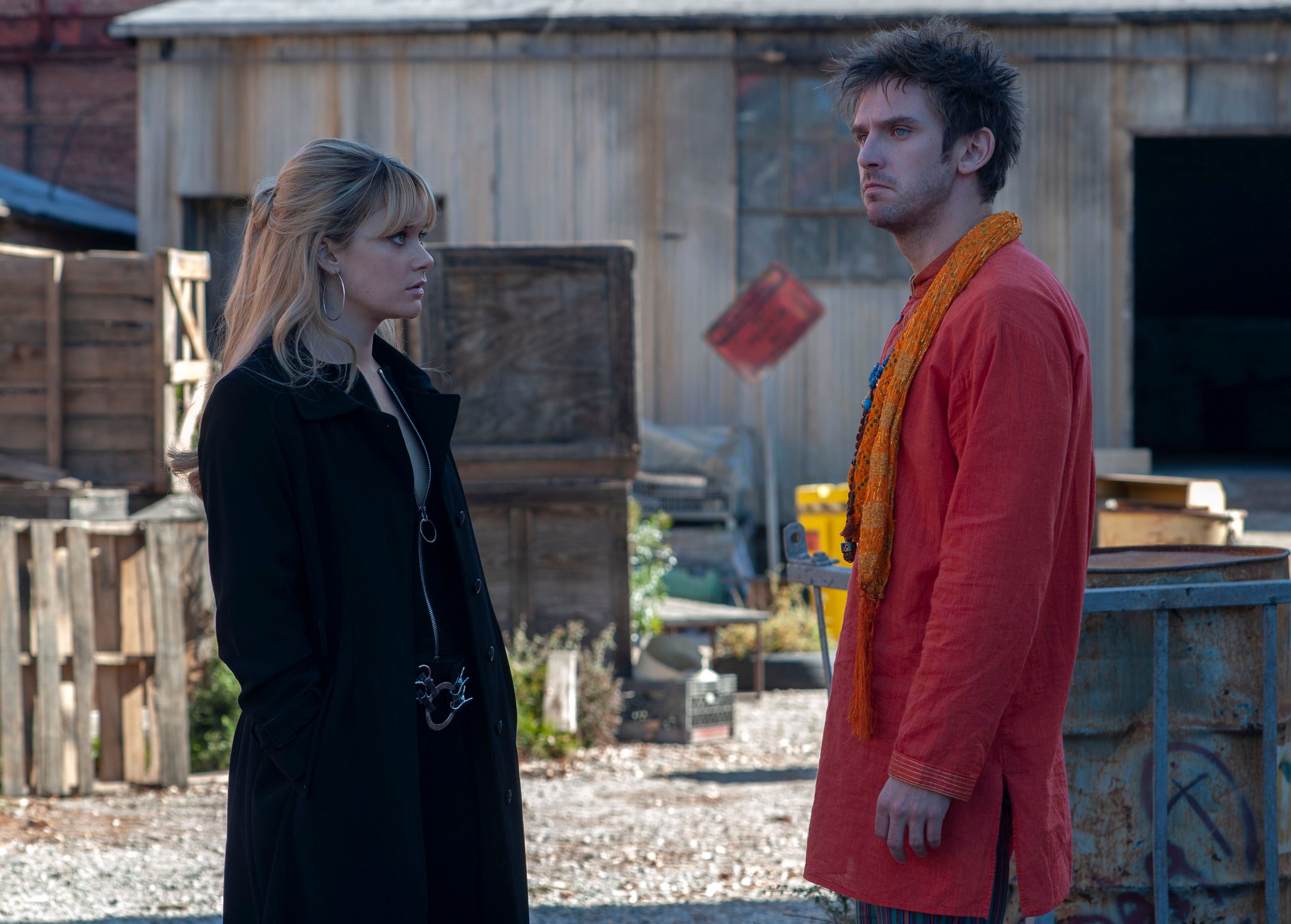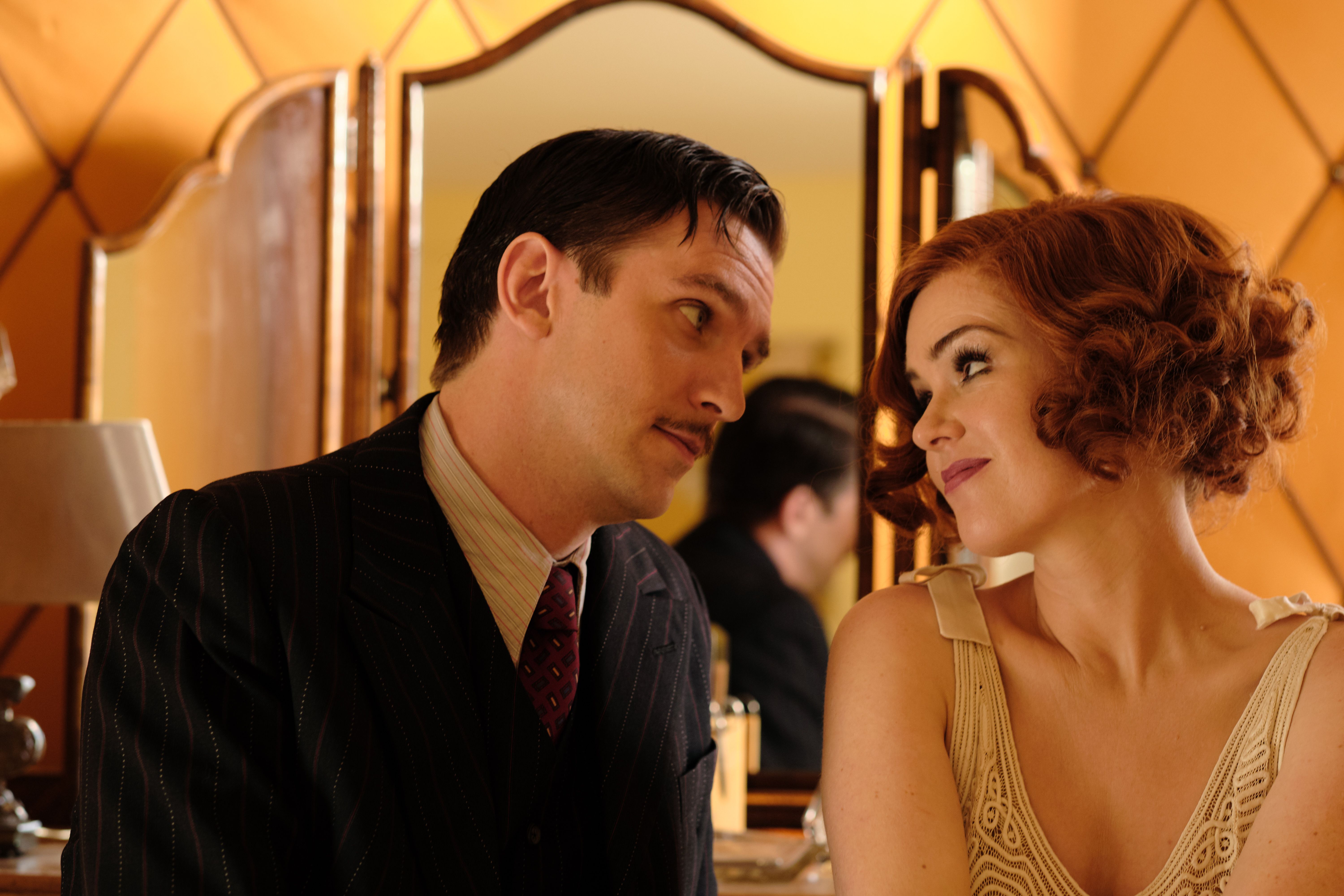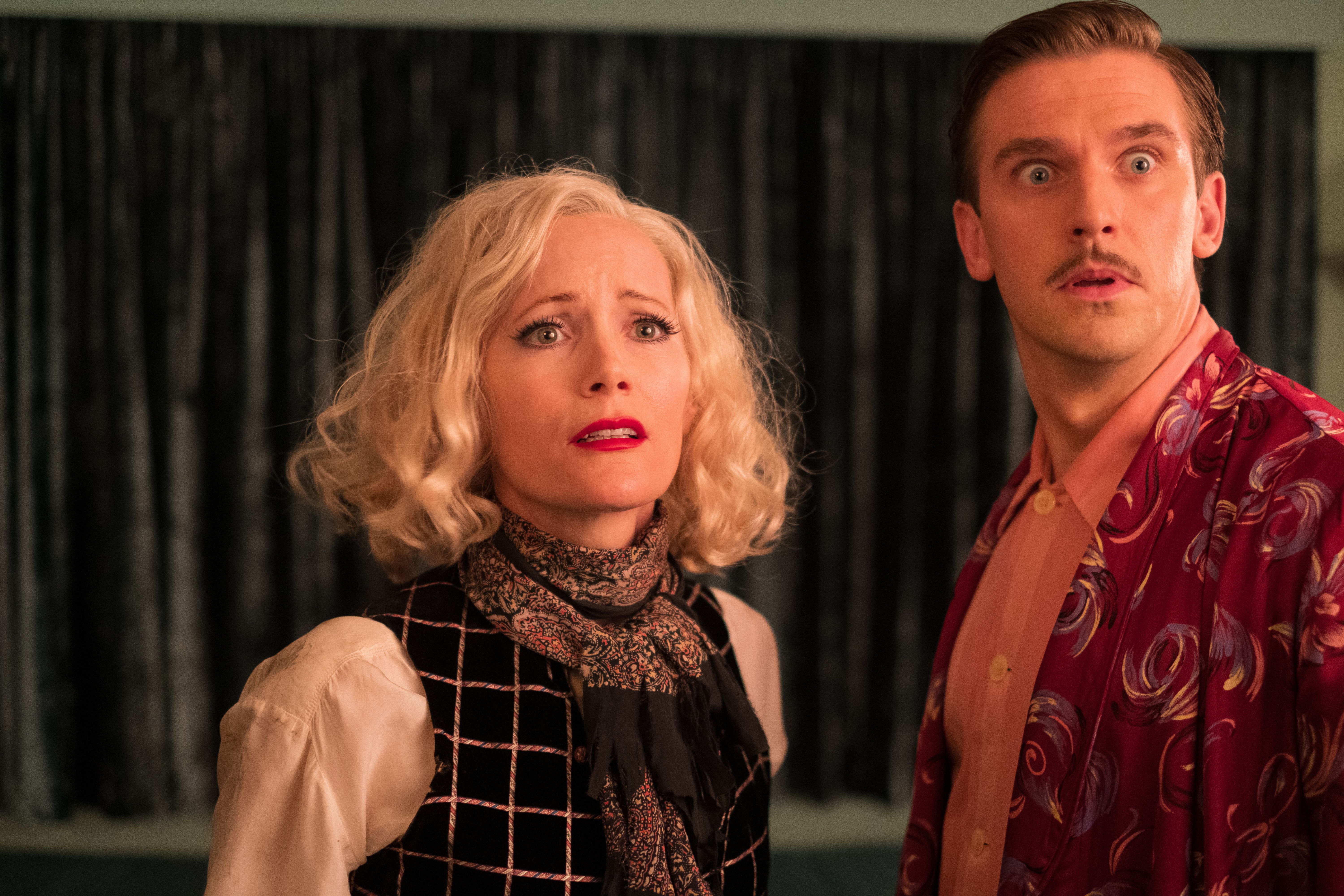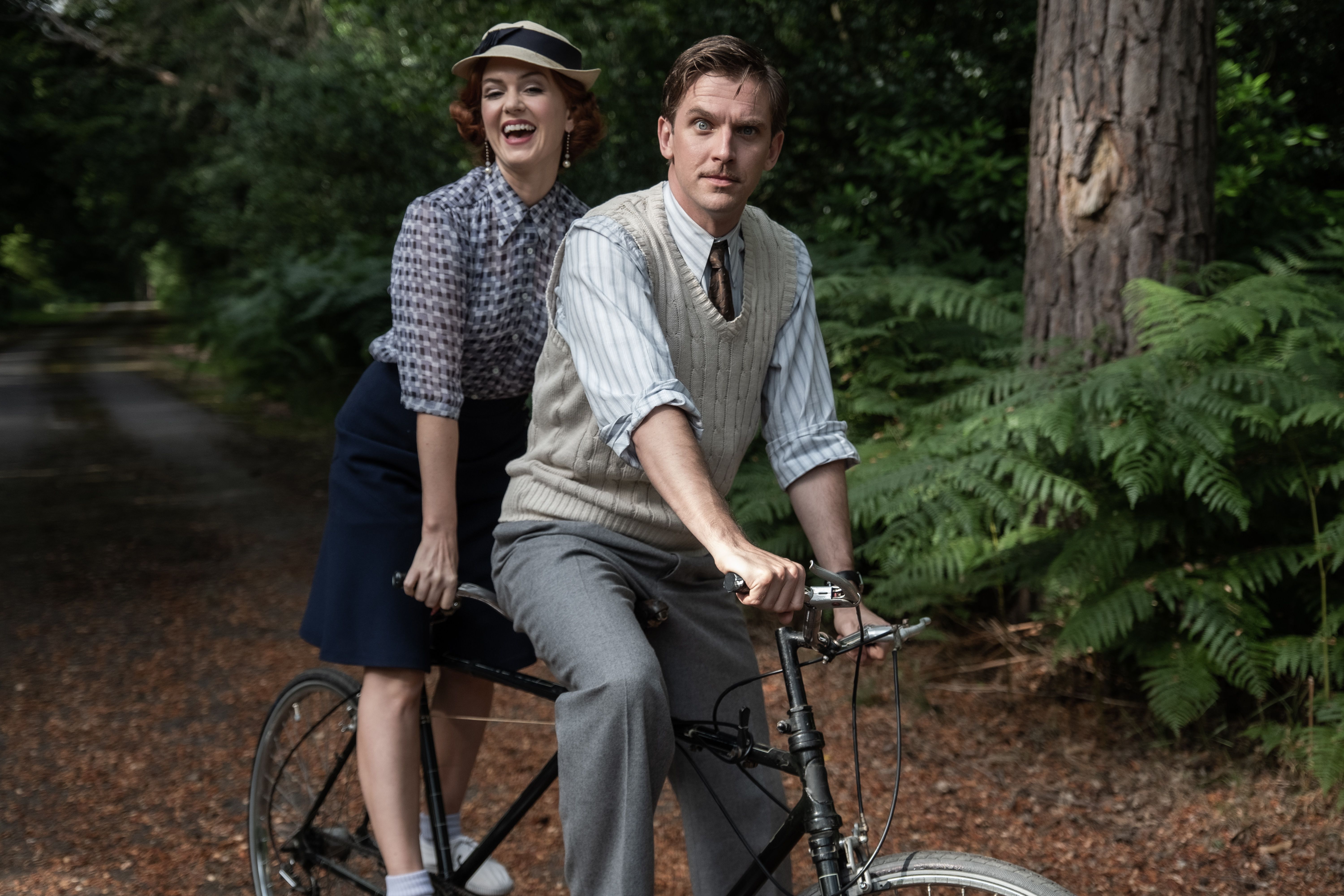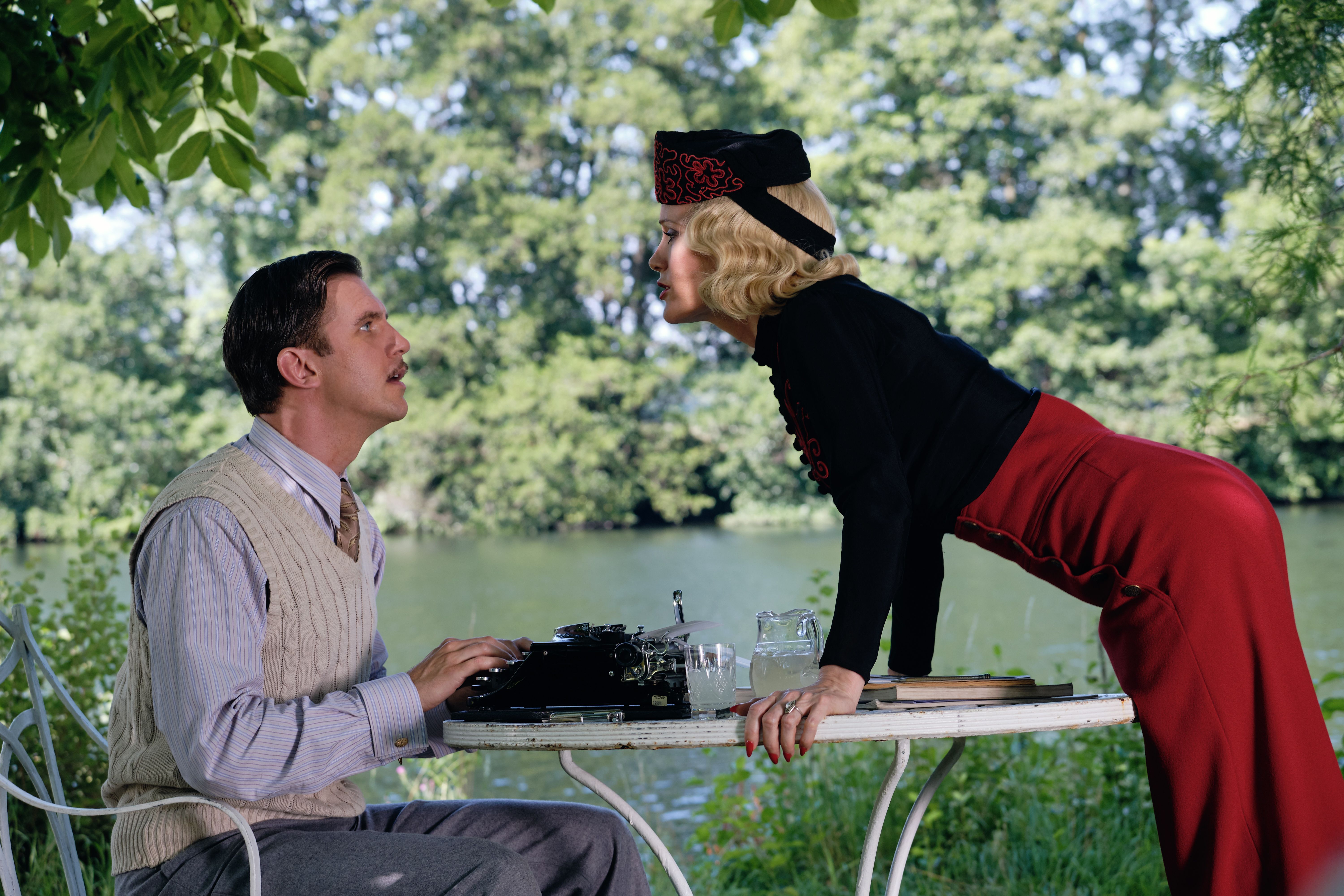With director Edward Hall’s Blithe Spirit opening in theaters, Digital and On Demand tomorrow, I recently spoke with Dan Stevens about making this new version of the Noël Coward play. If you’re not familiar with Blithe Spirit, it’s about a writer suffering from writer's block (Stevens) who gets an eccentric mystic (Judi Dench) to perform a seance in his home along with his new wife (Isla Fisher) and some friends. Unfortunately, Stevens’ gets more than he bargained for when the mystic accidentally summons the spirit of his deceased first wife (Leslie Mann) and he’s stuck between his two wives and their increasingly over-the-top attempts to outdo one another. Blithe Spirit is one of those plays that has been done numerous times across many mediums. It was first performed in the West End in 1941 and has been brought back many times on Broadway and in London over the past eighty years. In addition, it has been adapted for television, radio, and even David Lean directed a version of the material in 1945.
During the wide-ranging and fun interview, Stevens talked about making this new version, the tone they were going for, his thoughts on why no one had made a Noel Coward bioseries or biopic, what he learned working with Dench early in his career, how he gets ready for a role, when he first thought he made it as a working actor, and more. We also talked about his work on the fantastic series Legion and the series finale, and I asked a few fun questions about his no shirt policy and ab workout on Eurovision that I got from director David Dobkin.
Check out what he had to say below.
Collider: Do you think that you post too much on Instagram?
DAN STEVENS: Too much?
Yeah, I'm being sarcastic because you don't post that much.
STEVENS: I think there is such a thing as posting too much, and I hope I never get there.
You studied English lit at college in Cambridge. What was it that made you say, "I want to try my hand at acting"?
STEVENS: I think it was that that came first, that came before the wanting to study English at Cambridge thing. Yeah, that was always in my bones. What I studied at college sort of came on top of the bones.
When did you feel like you made it as a working actor? Because making it as a working actor is a really big deal with how many people that want to do it.
STEVENS: That's a good... I mean, it's still a question. No, I think... I don't know. I think that when that first paycheck comes in for the first play that you ever do, it feels like an amazing conversion to sort of turn your passion into a piece of paper with some money on it. But yeah, I don't know. I think that's a good question. As a kid, I didn't realize that it was something that you could actually do. It seemed like some sort of far-flung thing, and it sort of became more real the older I got, I guess.
You've done some great work through your career, but did you notice a completely different level with Eurovision in terms of people wanting to talk to you? Because that performance in that movie is fantastic.
STEVENS: Thanks, man. I was having a lot of fun as I hope you could tell. I think what's been fun about my whole career frankly, but certainly the last few years, the eight years since I've been living in the States has been just to kind of repeatedly surprise people, so to do something that might be in my wheelhouse, "Oh, I've seen that kind of thing before," and then just come out the gates with something like Lemtov where nobody's seen me do that before, and I think there's more where that came from, which is fun.
I mentioned to a few people I was going to talk to you, and someone did send in a question or two, and I believe his name is David Dobkin.
STEVENS: [laughing]
He wanted to know why you demanded to have a no shirt policy for Lemtov in your contract.
STEVENS: He must've read a different contract. I mean, did I demand that? That sounds suspect. I think he demanded that. I just had to go along with the choreography.
Well, he also has a part two. He wanted to know about your legendary ab workout to prepare for the part.
STEVENS: Oh, right. Yeah, yeah. A lot of calisthenics. Got one of those ab carvers. You ever seen those? Those frigging monster wheels with sticks on.
Right.
STEVENS: Whenever he would knock on my trailer door, I'd be just carving.
We are going to get to why I'm getting to talk to you today, but I-
STEVENS: I don't even remember why we're here, but it's fine. I'm having a great time.
I loved Legion and I did a deep dive interview with Noah, and believe me, I could spend an hour just talking about Legion and the filmmaking and everything about that series. But I am curious, I think that that series nailed the ending. I'm just curious what your take was when you read it and your take on the finale.
STEVENS: What was lovely about that was that it was pretty much how Noah had envisaged the whole thing. I know people want shows to run for like 27 years, but it just is not feasible. It's not good, generally. It's not interesting. And actually, if somebody has a three season arc, which is a story, it's a beginning, middle and end. You're not in some sort of endless open-ended thing. That was the ending as described to me. We'd go from cradle through the astral plane back to cradle, and yeah, I really liked the shape of that.
I loved the ambitious filmmaking on that series. Every episode, what the camera would do and the way it used music, color, everything about that series was way beyond what most people try to accomplish on a television series. Can you sort of talk about the challenges as an actor when you're doing these complicated camera moves and hitting your marks and what really goes on?
STEVENS: As somebody who is passionate about filmmaking, as an actor, I get really excited being in cool shots. So when you're working with whether it's Dana Gonzales or Polly Morgan, who are our two incredible DPs on that show, and we had this incredible operator who's worth a mention, he's called Mitch Dubin, and he's been Spielberg's operator for 20 years I'd say. I mean, he's done everything. And there were still days on Legion where he would look up from the lens and be like, "Wow, I've never seen that before." And I thought that was just amazing. To surprise a guy like that, to keep a guy like that on his toes, the passion from behind the lens really... It spreads through the whole set, I think, and yeah, there were some really crazy stuff that we were doing and those guys have been rightly recognized for that I hope.
Jumping into why I get to talk to you today, I don't understand how we're now in 2021 and no one has made a Noel Coward bioseries or biopic. How has that not been done yet?
STEVENS: That's a good question. I don't know. It's such a crazy life. It really is, and he did it all. I mean, he's not only one of the best parts of the Italian Job, in my opinion, he's an incredible on raconteur, musician. I mean, he really did it all. Vegas residency. I mean, he was just a sort of multihyphenate and an extraordinary man. So yeah, that's a good question. Maybe somebody will come up with that, I don't know.
When you examine his story and the influences he's done and all the plays he's written, it's great. So how familiar were you with this material, and the David Lean movie, and all the times it's been on the stage prior to getting involved?
STEVENS: I've never been in it. I don't know if I'd ever seen a production of Blithe Spirit on the stage. I had seen the David Lean film a long time ago, but what appealed to me about this particular version was just that it was trying to do something a little... I don't know, give it a bit more of a sort of modern flavor. Death Becomes Her was a big touchstone in terms of like tonally the kind of thing that we were going for, which hasn't really been tried with Coward before. I don't know. I think some of the Coward purists were very upset that it wasn't exactly as they would like to see it, but that's not the point. In my mind, I'd like to make an entertaining film for somebody who's never heard of Noel Coward, who's never seen this play and who's just coming at the comedy, and the silliness, and the tone of it. And it's at its heart. It's a very silly story, Blithe Spirit.
If I'm not mistaken, you guys had like a 35-day shoot to pull this thing off. Did you ever feel like your back was against the wall in terms of the making of it or was it a comfortable shoot? Because that's not a lot of time.
STEVENS: It's not. I mean, I've made films in fewer days certainly, and it's always... I mean, I think however many days you're given to make a film, I think you always wish that you had a few more, so I don't know. 35 these days sounds like a lot. I'm pretty sure the last thing I did was like 27 or something, and it was like, "Oh, okay, that's just what we're doing." Yeah. It just sort of... The work expands to fill the time available, I think, and sometimes that pressure is good and yeah, it keeps things moving. Yeah. I never felt like we were on this enormous time pressure.
I believe you got to work with Dame Judi Dench early in your career on Hay Fever.
STEVENS: That's right.
What is it like working with her? Because she's such a talented actor and revered, I'm just curious if you could talk a little bit about working with her on this and just in general.
STEVENS: Yeah. I mean, it was an incredible experience both to work with her so early in my career in the theater. I mean, I genuinely would spend... I was in the play for a handful of those scenes. She's obviously the grande dame of that play, but I was 22 and I would sit literally in the wings and watch her scenes and just bathe in it, really. It was amazing just to get to watch somebody who's so on top of their thing, so I feel like I learned a huge amount from her, not just about onstage, but also offstage as well. She was just incredibly courteous and had the most incredible lineup of people coming through, coming backstage and wishing her well, and just watching the grace with which she handled that as much as the way she handled the role on stage was something that really, really stayed with me, I think.
And she's still... I mean, she hasn't changed at all. I mean, it's only 10 years since that, but she's still incredibly graceful. Shows up, works a full day, has incredible wordy monologues that she just reels off, and she's just got so much energy and passion for what she does, I think, which just keeps her going and keeps everyone going. It's infectious.
I hate asking the generic thing, but when people aren't familiar with this play, movie, how have you been describing it to people?
STEVENS: I mean, our version is sort of a very silly supernatural romp. How's that?
That's actually very accurate. What is the secret to playing the middle of a supernatural love story?
STEVENS: That everything is real. I don't know. That sounds like a very wise thing, but it's not.
I’m curious what you're doing prior to showing up on set the first day. So if we use this as an example, and maybe it's different for each project, obviously, depending on the research and what you need to do to prepare, but how do you typically like to get ready so the first day on set you feel comfortable with whatever you're going to be doing?
STEVENS: I mean, there's a sort of multi-pronged to that. It's just... Yeah, reading, preparation. I love working with costume designers and getting the look and the feel so that you show up and you know exactly the clothes you're going to be jumping into fit that character and you're all good there. The creepy mustache in this case was essential to get right. Every time you meet another department head, I guess, you meet the DP and the production designer, and you see the look and feel of the space you're going to be in, and then you start inhabiting the costumes, all the while you're reading the script and processing that, you meet the other actors who were going to be playing, and it's just an amazing kind of alchemy in general, just filmmaking for me, I think, so each step of the way, kind of something else locks into step, I think.
Do you typically like to break down the entire script before day one of shooting in terms of how you're going to be doing everything, and how much are you sort of like looking at what you're doing in the next few days and really devoting it to just that?
STEVENS: I mean, again, it very much depends. There are certain things that you'll end up shooting that actually require more kind of instinct in a way, often kind of wordless moments or whatever, and often with action sequences you've been rehearsing it with a stunt team and just requires physical presence of mind. Then there are other days where you have an entire three, four-page scene, or some giant monologue that you've been kind of plowing over in your mind for weeks and you can't wait to get it out there, so it really varies.
I think if you're over-prepared and too fixed in some of the ideas you have, that means that on the day things don't happen maybe quite so fluidly, and there's not that sort of spontaneity, but at the same time, if you're totally unprepared then it can be just as much of a disaster, so it's finding that marriage, I think, between preparation and then having the presence of mind to be a little felicitous on the day and just sort of on your toes and playful with the other actors and director, if that's what is happening.
I've spoken to a few actors, and they all talk about how the first few days on set, they always feel like they wish they could redo everything, like if they could refilm the first two days, and I'm curious if you ever feel like that?
STEVENS: There are definitely days like that, and I love days where a scene will take... If you have the luxury of time, some scenes can take two days to shoot, and I've had a few of those where you go home and you're just lying in bed at night or whatever it is, and you're just like, "Ah, should've done that, or..." And sometimes there's a chance to go and pick that up in the morning. Text the director at 2:00 AM and they're like, "Okay, no, that's not going to happen," but you know, in your mind, you have the opportunity to set it right. But just as often, you'll go home and that day is done and you'll never revisit that again.
I heard a great story that Donald Sutherland in his contracts makes it that the first two weeks of filming when he has a role, it has to be from the middle of the shoot because he feels that by the middle of the movie, you've bought into whatever he's selling, and if he makes a bad choice, no one's going to notice it, but-
STEVENS: Oh, that's hilarious. I wonder if I should start doing that.
When I heard this information, I thought it was the most brilliant thing ever because you don't want to be filming-
STEVENS: Watching the middle of all these Donald Sutherland movies now and being like, "Huh, that feels very day one."
But seriously, because the first time you see him on camera in a role, that's when you're going to... Anyway, I thought it was brilliant because by the middle of the movie you're buying into whatever's being sold.
STEVENS: Sure. Hopefully.
Well, yeah, that's true.
STEVENS: He's a good salesman.
What's this Amazon series Solos that you're doing?
STEVENS: Ah, so this is very exciting. It's David Weil, his new show, and it's a series of either sort of monologues or duologues with some very, very special people. And yeah, it's beautiful writing and we managed to get a shot during this whole time under very strict protocols, and yeah, it's extraordinary that we managed to get it done. Yeah, very, very excited about that. I don't know how much more I can say about it at this stage, because there's only just an amount out the gate. But yeah, I mean, last year was a pretty extraordinary year for all sorts of reasons, and I think this on top of that is just sort of extra, extra extraordinary,
Completely. Thanks a lot for giving me your time today.
STEVENS: Nice to see you. Have a great day.
You too.

